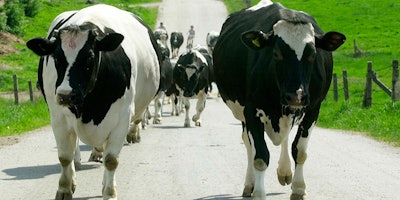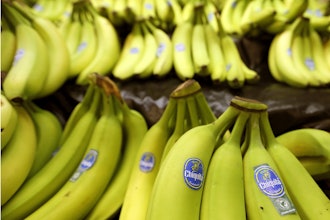
WARSAW, Poland (AP) — Polish government officials denied that sick cows were slaughtered for meat in Poland as European Union investigators began a weeklong inspection Monday based on a media report that beef from unfit animals was exported to more than a dozen countries.
Poland's top veterinarian, Pawel Niemczuk, said two EU investigators looked through documents and held talks with meat safety officials. They plan to meet local veterinary inspectors and visit slaughterhouses later in the week, he said.
The visit followed an investigative report by private broadcaster TVN, which included video footage recorded undercover that showed lame or diseased cows being killed at night near the northeastern town of Ostrow Mazowiecka.
A veterinarian was not present at the slaughterhouse, which is required under Polish law.
Polish prosecutors have opened a probe. But the country's top agriculture and veterinary officials said Monday that tests found no signs of disease or danger to consumers and insisted some 9.5 tons of meat were pulled from the market only as a precaution.
"There were no sick cows, only the culling procedures have been broken," Agriculture Minister Jan Krzysztof Ardanowski said.
Poland is a major exporter of beef and the TVN report has sparked concerns across Europe, particularly since some of the exported suspect beef was distributed to restaurants and schools. Polish officials say the report was harming food exports.
Anca Paduraru, a spokeswoman for the European Commission, said Poland reported the problem on Jan. 29 to the EU's Rapid Alert System for Food and Feed, which is used to quickly track down unsafe food and remove it from the market.
Niemczuk said more than 2,500 kilograms (5,500 pounds) of the suspect meat was exported to several European countries.
The Polish veterinary inspectorate stripped the slaughterhouse of permission to operate, effectively closing it, and fired its two veterinarians, along with the regional veterinarian.
Authorities and beef producers said they were taking immediate steps to prevent such unlawful practices.
Nearly 800 kilograms (1,765 pounds) of beef from the Polish slaughterhouse was sent to France. Most was seized and destroyed but some was sold to consumers, French authorities said.
The revelations have sparked concerns and criticism of Poland's food safety procedures.
"Unfortunately, it's obvious that Poland doesn't have a functioning system of control and veterinary inspection. Or the law has been violated," said Czech Agriculture Minister Miroslav Toman, adding that 300 kilograms (660 pounds) of the Polish meat was discovered in his country.
Slovakia's agriculture minister summoned the Polish ambassador to Bratislava on Friday over the scandal and doubled the amount of suspected Polish meat sent there to 600 kilograms (1,320 pounds). Some of it was distributed to schools and restaurants.
Louise Nyholm of Sweden's National Food Agency has called it "a serious violation of food law and totally unacceptable."
Swedish authorities say 240 kilograms (525 pounds) of the meat were found in Sweden, of which nearly 100 kilograms (220 pounds) were consumed. The agency said all the meat has since been withdrawn from the Swedish market.
___
Jan M. Olsen in Copenhagen contributed reporting.





















